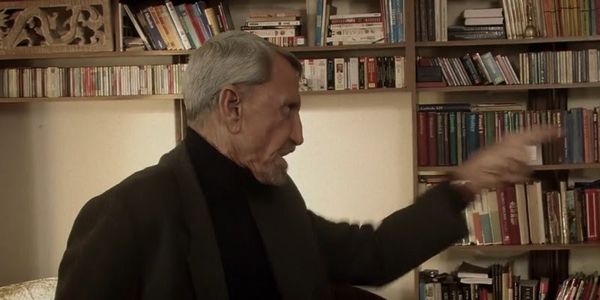Eye For Film >> Movies >> Beautiful Blue Eyes (2009) Film Review
Beautiful Blue Eyes
Reviewed by: Jennie Kermode

Roy Scheider is one of those actors who never faltered with age and always retained his dedication to his craft. His final performance, in this very personal film by Joshua Newton, is a testament to that craft, and will not disappoint fans. Finally patched together over a decade after it was shot, the film itself has structural problems and is rather less satisfying, but there’s a solid story underneath it.
Scheider plays Joseph, a former police officer visiting Germany to see his son’s family. It’s not clear whether or not this is the first time he has been there since the Second World War, but he clearly finds it difficult, imagining Nazi officers everywhere – an experience rather crudely conveyed by black and white point of view shots which keep appearing every minute or two long after the point has been made. We know something of what Joseph has been through thanks to a prequel (where he’s played by Alexander Newton) in which we see Nazis arriving in his village to seize his family. We return to this narrative at intervals throughout the film, but those initial scenes are really all that’s needed to get the message through.

Joseph’s awkward interactions with the family and a little grandson who primarily speaks German form the most interesting part of the film, as we delve into character and his son’s resentment about a life spent chasing Nazis rather than focusing on the people around him in the present day. Its purpose is simply to set the scene, however, for what happens when he meets an elderly neighbour and becomes convinced that, despite having a different name, he is in fact the man who murdered his parents and siblings all those years ago.
The idea that such an encounter might occur in this way might seem unlikely but, of course, it’s precisely this sort of chance which led to many Nazis being caught over the years. Furthermore, the film is (loosely) based on the story of Newton’s own father. With mistaken identity a real possibility, however, Joseph’s son and daughter-in-law are wary. To them, it seems like the latest manifestation of a lengthy obsession, and as he expresses his intention to investigate the neighbour, they worry that it could get him into serious trouble.
The problem with the way the story plays out is that it leaps straight into the action without giving us room to see the personal impact of the encounter (though Scheider makes the most of what he’s given), and an important twist in the tale is delivered as a postscript. One can see why Newton wanted to focus on the thriller aspects of the story and on the moral crisis faced by two of his characters, but the resultant pacing is poor and we miss out on what are potentially some of the most interesting character moments. The older Joseph doesn’t get much of a character arc. Is this simply an artefact of some planned scenes not being shot? That's unclear, but even in Scheider's absence, it's easy to see ways in which the material might have been arranged more effectively.
This approach also sidelines the female characters, which is a waste of two of the film’s most capable actors. Anna Polony shines in her one substantial scene as the neighbour's wife and one is left longing to see how she would have handled the matter addressed in that postscript.
Worth watching for the performances, Beautiful Blue Eyes still feels like a bit of a missed opportunity, and one wonders if Newton was simply too close to it to see clearly where its greater potential lay. Nevertheless, it gives Scheider a fitting swan song, taking on a character type we have seen many times before and making him into a fully fleshed human being who is easy to feel for, regardless of his flaws.
Reviewed on: 08 Sep 2022

















